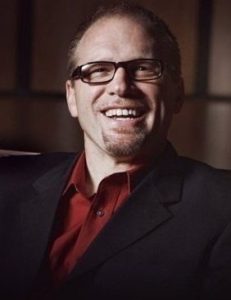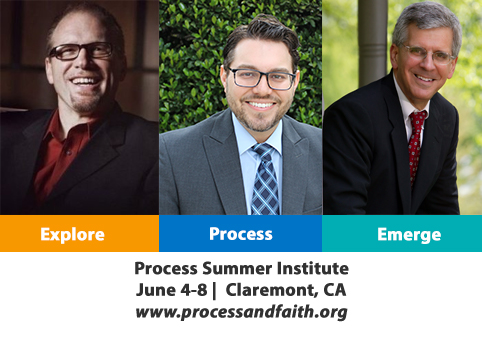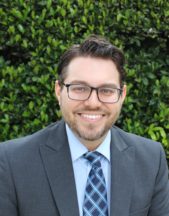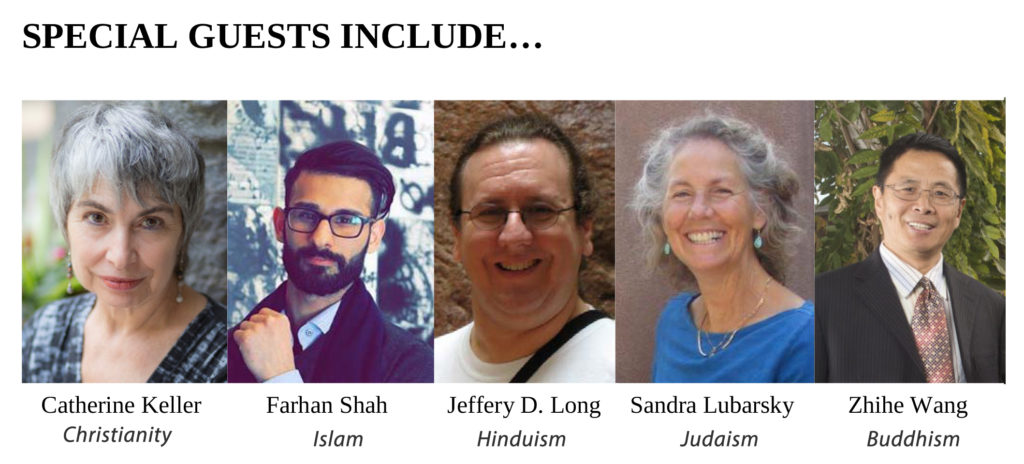Process Summer Institute, June 4-8
[maxbutton id=”1″ url=”https://processandfaith.org/product-category/2018-summer-institute/” text=”Register Now” ]
(Discounted Non-Credit Registration Prices until June 1)
EXPLORE PROCESS THEOLOGY WITH:
Thomas Jay Oord in the course
Exploring Process Theology among the Varieties of Open and Relational Theologies
9:00 am – 11:00 am, Monday – Friday

Open and relational theologies come in many forms. Process theology is one of the best known. But many who embrace beliefs common to open and relational theologies distance themselves from the “process” label. Why is that? What is at stake? What do words like “open,” “relational,” and “process” mean? And where does “love” fit in? This course explores ways God can be thought to be in process, relational, and open. It draws from progressive & conservative voices, the Bible & science, common experience & miracles, and more. Along the way, opportunities for new open and relational beliefs will likely emerge, as we explore and generate novel views of God and existence.
Wm. Andrew Schwartz in the course
Process Theology in the World’s Wisdom Traditions: Buddhism, Islam, Judaism, Hinduism, and Christianity
1:00 pm – 3:00 pm, Monday – Friday
No doubt, Process Theology has been developed most fully within the framework of progressive Christian (liberal) theology. As Gary Dorrien notes, “Whiteheadian process theology became the leading liberal school in the second half of the twentieth century” (The Making of American Liberal Theology, 190). However, many of the core principles of Process Thought are also found within other major Wisdom Traditions. This course will examine how process thought intersects with, and takes shape through 5 of the world’s religions (Buddhism, Islam, Judaism, Hinduism, and Christianity); exploring ways in which Process notions of power, knowledge, freedom, ultimacy, love, etc. are being expressed in each tradition. The course will be supplemented by guest speakers representing each of these faith traditions.
Jay McDaniel, in the course
Intimacy & Transcendence in the Thick of Life: Exploring Process Theology through Popular Music
4:00 pm – 6:00 pm, Monday – Friday
This course explores relations between popular music and process theology, drawing upon resources from NPR music as a primary source for understanding what is going on “musically” in the worlds of popular music. By listening to the music profiled by NPR, reading selected articles on popular music and theology and short essays from Open Horizons, we will explore ways in which various genres of popular music, and various artists, communicate key ideas in process theology and can serve to “introduce process theology” to a new generation. Please bring your musical tastes, and get ready to have your ears stretched.
And Join in the Lunchtime Process & Ministry Round-Table Discussions
with David Grant Smith, facilitator
11:15 am – 12:45 pm, Monday – Friday
 Join with other Summer Institute participants in discussing how Process Theology can be utilized in various aspects of ministry. Each day there will be a brief presentation from a “boots on the ground” process theologian, followed by an open discussion of how Process Theology can be used in ministry settings. In these discussions, we are all experts, working to share our ideas and experience. Lunch can be purchased in advance when you register, or you may bring your own. Either way, plan to join in these lively and productive discussions, aimed at sharing ideas for the use of Process Theology in a variety of ministry contexts.
Join with other Summer Institute participants in discussing how Process Theology can be utilized in various aspects of ministry. Each day there will be a brief presentation from a “boots on the ground” process theologian, followed by an open discussion of how Process Theology can be used in ministry settings. In these discussions, we are all experts, working to share our ideas and experience. Lunch can be purchased in advance when you register, or you may bring your own. Either way, plan to join in these lively and productive discussions, aimed at sharing ideas for the use of Process Theology in a variety of ministry contexts.
| MONDAY | Process Theology in Pastoral Care | David Grant Smith |
| TUESDAY | Process Approaches to Preaching | Jeanyne Slettom |
| WEDNESDAY | Process Theology & Healing | Bruce G. Epperly |
| THURSDAY | Process Theology in Group Processes | Jeanyne Slettom |
| FRIDAY | Process Theology & Social Justice Ministries | Timothy Murphy |
This year’s Process Theology Summer Institute will take place June 4-8, 2018. Our intensive courses are designed to introduce basic issues in the theory and application of process theology. Participants may attend the Institute in person on the campus of Claremont School of Theology, or online in the comfort of their own homes. Broken down into distinct parts with different course facilitators, the Process Theology Summer Institute may be taken as a single 3 credit course, as individual 1 credit courses, or without credit directly from Process & Faith. Content for this year’s courses are still being arranged, so please check back here regularly for updates, or email us at office@processandfaith.org with your inquiries.
Join us in Claremont or Online!
For Academic Credit:
- Classes may be taken for 1 semester unit of academic credit or 1 advanced course of study credit through Claremont School of Theology at the posted tuition rate. Students who wish to take all three Summer Process Institute courses must register using the Summer Institute course number, and will not be allowed to register for the courses individually. Registered students should contact the Center for Process Studies for classroom information.
- Non-CST students may also take the course for credit. Please fill out and submit the Transient Student and Course Registration forms to the CST registrar at jallen@cst.edu. DEADLINE, MAY 29th.
- Classes are available in person or fully online.
- CST students who want credit, register through the CST registrar in consultation with your advisor.
For Personal Enrichment:
(Discounted Non-Credit Registration Prices until June 1)
The entire week may be taken as personal enrichment for $300 payable to Process & Faith/CST, or each segment for $125. Please register below; prices go up May 1.
FAQ
- I’m a CST student and I would like to take this class for credit. How do I do that?
CST students who want credit, register through the CST registrar in consultation with your advisor. - I’m a graduate student at an accredited institution, and I would like to take this class for credit. How do I do that?
- I don’t know about this online thing! Can I come to Claremont?
Sure you can. We would very much enjoy having you join us, whether in person or online. - If I come to Claremont and don’t live nearby, where can I stay?
Here is a list of local hotels. - If I’m in Claremont, where can I go for lunch?
We have provided a map highlighting some places within the area. Click here to go to the page. Also, consider checking out the Claremont Village. - Can I get Continuing Education Units (CEUs) for taking any of these classes?
Yes. Continuing Education Units (CEUs) are available through the Registrar’s office of Claremont School of Theology. Payment for the CEUs is in addition to cost of registering for the Summer Institute. If you would like to register for CEUs, first please register for the Summer Institute course(s) and/or lunchtime workshop you would like. Then click on the link for the Process Theology Summer Institute CEUs page and register for the course(s) and/or lunchtime workshop for which you would like to receive CEUs. If you have any questions about CEUs, don’t hesitate to email Process & Faith directly.
- Are online classes only offered in “real time?” Or if I miss an online class session, can I get a recording of the class session?
The online option is offered live, in real time. Each course session will be recorded for archival purposes, and may be available for viewing upon request. - Do I need to read anything before class starts?
There is a syllabus posted for each course on the Summer Institute info website which will indicate whether there are any assigned readings. Additionally, if there are assigned or suggested books, you can purchase them through wherever you shop for books, or they will be available through the Flux Bookstore in the Center for Process Studies. - Is there homework?
Those taking the course for credit will be required to write a 10 page paper (or creative project equivalent) for each segment taken. Please consult your instructor directly for more information and to get approval on paper/project topics.
Non-Credit Registration
(Discounted Non-Credit Registration Prices until June 1)
[maxbutton id=”1″ ]





